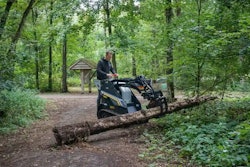A while back Time magazine did a cover story on “multi-taskers,” those ambi-directional workaholics who keep their e-mails, cell phone calls, BlackBerry blips, meeting schedules, conference lineups, tradeshow appointments, flight arrangements, customer complaints, soccer-league games, church committees and volunteer work all tumbling forward in some simulacrum of progress.
The article gave the impression that multi-taskers were to be lauded, as if they were a new high point in evolution. This, I doubt; but there’s no turning back from the modern communication technology that makes this multi-tasking possible.
Construction, because of its intensely physical nature, has been one of the last industries to benefit from all these digital innovations. But that is changing fast as weatherproof, ruggedized GPS systems and wireless technology increasingly give tech-savvy contractors a leg up on the competition.
What is worrisome is that technology’s multiple distractions can overwhelm people who lack the ability to steer to a fixed point on the horizon. Information overload can lead not only to confusion, but the illusion of progress. Just because you’re pointing and clicking, sending and receiving, doesn’t necessarily mean work is getting done or that the work you’re doing is good.
People are interrupted so many times by so many different “devices” that they never finish one task before moving to the next. I call this: device-induced attention deficit disorder, or DIADD. As the technology tidal wave sweeps over the construction industry in the next few years, I wouldn’t be surprised if a lot of construction managers wind up suffering from DIADD as well.
The biggest danger with DIADD is not that you won’t get anything done – you will, however chaotic and draining the process may be. But long-term exposure to multiple points of information leaves us with little time to reflect, evaluate and strategize beyond what happens after the current crisis.
The problem, however, is not the devices – it’s us. I have no intention of giving up word processing for a manual typewriter. And I doubt any contractor will ever throw his GPS equipment in the tool shed and go back to grading and staking the old way. But I have learned that at least one day a week, I need to turn all the devices off – television, perhaps the greatest distraction, included. Sunday is appropriate. I felt a few withdrawal pangs the first few weekends I tuned out. But it didn’t take long to realize that on those days I was having better conversations with my wife and kids, restarting a few books I’d once abandoned, playing more with the dog and really enjoying the day. Best of all, I felt refreshed and recharged when Monday morning rolled around.
Despite its hip cachet, 24/7 is an evil thing. Before your life gets drawn and quartered by DIADD, I’d recommend you consider something more like 24/6. Today’s technology makes us all more productive. But we need to bend it to our will and not the other way around.






